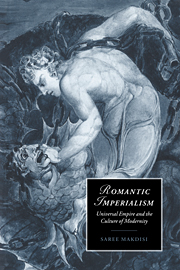Book contents
- Frontmatter
- Contents
- Preface and acknowledgments
- 1 Introduction: Universal Empire
- 2 Home imperial: Wordsworth's London and the spot of time
- 3 Wordsworth and the image of Nature
- 4 Waverley and the cultural politics of dispossession
- 5 Domesticating exoticism: transformations of Britain's Orient, 1785–1835
- 6 Beyond the realm of dreams: Byron, Shelley, and the East
- 7 William Blake and the Universal Empire
- 8 Conclusions
- Notes
- Bibliography
- Index
- CAMBRIDGE STUDIES IN ROMANTICISM
6 - Beyond the realm of dreams: Byron, Shelley, and the East
Published online by Cambridge University Press: 29 September 2009
- Frontmatter
- Contents
- Preface and acknowledgments
- 1 Introduction: Universal Empire
- 2 Home imperial: Wordsworth's London and the spot of time
- 3 Wordsworth and the image of Nature
- 4 Waverley and the cultural politics of dispossession
- 5 Domesticating exoticism: transformations of Britain's Orient, 1785–1835
- 6 Beyond the realm of dreams: Byron, Shelley, and the East
- 7 William Blake and the Universal Empire
- 8 Conclusions
- Notes
- Bibliography
- Index
- CAMBRIDGE STUDIES IN ROMANTICISM
Summary
The settler makes history and is conscious of making it. And because he constantly refers to the history of his mother country, he clearly indicates that he himself is the extension of that mother country. Thus the history which he writes is not the history of the country which he plunders but the history of his own nation in regard to all she skims off, all that she violates and starves.
Frantz Fanon, The Wretched of the EarthJames Mill writes in his History of British India that “whatever is worth seeing or hearing in India, can be expressed in writing. As soon as every thing of importance is expressed in writing, a man who is duly qualified may obtain more knowledge of India in one year, in his closet in England, than he could obtain during the course of the longest life, by the use of his eyes and his ears, in India.” Mill argues that the entire reality of what was for him an “object” called “India” can be defined by being captured in writing, just as its territory had been defined by being captured by the armies of the East India Company. He is “correct” to the extent that imperial rule from London relied upon the minute documentation of the endless activities of the Company in India, so that what was being judged and decided upon by the directors in London were not the material activities themselves, but rather the documents produced alongside them – not, in other words, the “realities,” but the “representations.”
- Type
- Chapter
- Information
- Romantic ImperialismUniversal Empire and the Culture of Modernity, pp. 122 - 153Publisher: Cambridge University PressPrint publication year: 1998



